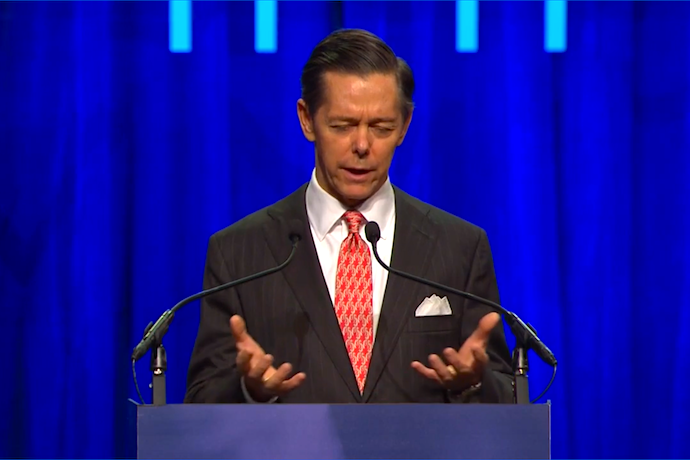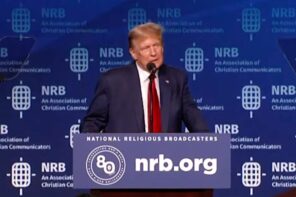As anyone with access to the internet is likely aware, former college football star Hershel Walker is running for US Senate in Georgia as a pro-Trump Republican. Walker, who has four children—three of whom he appears to have just recently acknowledged—doesn’t believe that transgender kids will go to heaven. As he told the crowd at a September rally in Georgia:
“I want the young kids to know, you go to heaven. Jesus may not recognize you. Because he made you a boy. He made you a girl. Why are we talking about things like that?”
Walker’s anti-trans rhetoric would have been right at home at last month’s Pray Vote Stand Summit, the most influential Christian-Right political conference in the United States, held annually by the Family Research Council. Both Walker and his Democratic opponent Raphael Warnock were invited, but neither showed—an interesting political choice in a tight race that will help decide which party controls the Senate.
Georgia is also hosting a gubernatorial race this year, and Republican incumbent Governor Brian Kemp wisely did attend Pray Vote Stand (PVS), opening the first full day of the conference with a passionate screed against “rogue local governments” and federal overreach. Both races are crucial. With the state teetering between Democratic and Republican control, the lives and livelihoods of transgender people, people who need abortions, Black people, sex workers, people living with MPX and HIV, students, parents, and older people are at stake.
Anti-transgender rhetoric set the tone
Tony Perkins and the rest of the staff at PVS were cognizant of their role in influencing anti-trans advocacy across the US. (Family Research Council is a national partner of the Promise to America’s Children, a coalition of Christian Right organizations focused on providing law makers with sample legislation to ban trans-affirming care, abortion, comprehensive sex education, and other conservative culture war issues.) Across two panels and nearly every speaker, anti-trans rhetoric was rampant. Jokes abounded (can a fat person identify as trans-slender? Yuk yuk!) as the rather small crowd of around 300 obediently laughed and groaned.
The message was clear: “Gender fluid anarchists,” as conservative Christian radio host Todd Starnes put it, are coming to recruit our children to their “transgender ideology.” In the minds of the PVS speakers, transition is a horrifying prospect. It starts with clandestine conversations between trans youth and their teachers, moves into mysterious hospital visits, and winds up with permanently mutilated bodies roaming the streets freely like some transgender zombie horde, recruiting everyone in their paths.
Five years ago, Meg Kilgannon, now a Senior Fellow at Family Research Council, was just a concerned mother with a kid in public school in Fairfax County, Virginia. At the 2017 FRC summit, then called Values Voter Summit, Kilgannon set out a playbook for anti-LGBT activism. Her three points were clear: “Focus on gender identity to divide and conquer”; no personal attacks on LGBT people or parents of trans children; and don’t use religious arguments, because they aren’t effective.
At the 2022 summit, Kilgannon took center stage, appearing on multiple panels to talk about her anti-LGBT advocacy. So has the Christian Right heeded her advice? Certainly the focus on gender identity was omnipresent at PVS. Speakers indeed made few directed attacks against individual trans youth or their parents, focusing instead on medical professionals, educators, and anyone advocating for health care for trans people. But the warning against religious arguments—well, that seems not to have stuck.
Below, Asia details their experience at a closed-door session during which young attendees ages 12 to 21 were encouraged to ask their burning questions about gender identity and biblical worldview. As they make clear, religious arguments comprise the bulk of anti-trans ideology from FRC, bolstered by medical disinformation spread by legitimate-sounding groups like the American College of Pediatricians and the American Association of Pro-Life Obstetricians and Gynecologists. “Biblical worldview” rhetoric reigned supreme, as Tony Perkins and the other speakers dragged us along a theological journey in opposition to trans-affirming care and, in fact, all bodily autonomy.
Two panels at the summit focused directly on trans lives. The first brought a father and his attorney to the stage. Wendell Perez and his wife are suing their child’s school district after a suicide attempt revealed that the school had been working with the Perez’s child to affirm their transgender identity. Perez was furious. “Confusion is not from God,” said Wendell Perez, “For 50 years we did very well defending our children in the womb. It’s time to defend our children outside of the womb, and our families.”
Perez was drawing a direct line between antiabortion and anti-transgender activism—not the only time the connection was raised at the summit.
The second explicitly anti-transgender panel featured two people who identify as “detransitioners,” which usually means those who identified as transgender and now do not. Anti-transgender advocates, organizations, and media outlets have been platforming anti-trans detransitioners for a few years now.
In fact, one of the detransitioned speakers at PVS actually spoke at the 2019 Values Voter Summit. KathyGrace Duncan shared the same story in 2019 that we heard in 2022: she was a devout Christian who identified as a man for many years until, as she puts it, “God called her back.” Author Erin Brewer joined Duncan on stage and shared her own story of identifying as a boy in first grade before being set right by officials at her school.
Brewer, Duncan, and a third panelist Jennifer Bauwens, Director for the Center for Family Studies at FRC, cautioned attendees about the “affirmative care” model, despite gender-affirmative care being the standard set by the World Professional Association for Transgender Health, the American Medical Association, the American Academy of Pediatrics, and the American Psychological Association.
Each of the three panelists added color to the picture they painted of predatory therapists offering surgical interventions to young trans or nonbinary children. Being trans is merely a trauma response, they asserted. Children are being permanently scarred, made permanently sterile, and told they’re inherently flawed from birth.
It need not be said that healthcare providers are not providing surgical, or even hormonal intervention to young children. Hormonal intervention isn’t even effective until puberty. Facts aside, this panel was a master class in mis- and disinformation. Children need to be told “Who they are born is ok and no matter how much they change, they are who they are born,” said Brewer. Justifying her detransition, Duncan added “I needed to be obedient [to God].”
Connecting back to the fight against abortion care, Brewer threw down the gauntlet. “It’s time to fight for the born.”
Focus on youth
Centering youth as justification for and agents of the Christian Right agenda continues to be a major part of the FRC’s political strategy, both to maintain the dwindling numbers of young people in the Christian Right and to proselytize to youth nationally. The Christian Right knows that Gen Z has the highest percentage of LGBTQI identification and, as he wrote earlier this year in World magazine, Joseph Backholm, Senior Fellow at the Family Research Council and a speaker at the youth session, is afraid it’s contagious.
While a child’s ideal home might be conservative and Christian, the panelists at Pray Vote Stand’s “Blue Schools in Red States: Ideas for Reform” panel shared that schools across the country—particularly public schools—are attempting to instill radical leftist values in youth by accepting their queerness and teaching them critical race theory. Up against the behemoth of a liberal education, discipling children into conservative evangelicalism early becomes crucial to inoculate youth against ungodly ideas that might make them stray from the Family Research Council’s influence.
At PVS’s closed-door youth Q&A, panelists Joseph Backholm, Nik Godshall, and Janae Stracke made it clear that no question was off the table. It was okay for youth to ask questions about confusing ideas they heard during the conference, feelings about their gender and sexuality that they were grappling with, or struggles they had connecting with their liberal peers.
Backholm, Godshall, and Stracke’s eloquent responses were solidly rooted in the FRC’s messaging. As George Barna, Senior Research Fellow at the FRC, hammered home in his speech from the main stage, the dwindling alignment with conservative evangelicalism amongst Millennials and Gen Zers makes retention of youth a top priority for the Christian Right.
Falsely equating gender dysphoria (the condition of being assigned a different gender at birth than one actually is) with body dysmorphia (the condition of feeling hypercritical of one’s body), Stracke made a direct appeal to any trans young people in the audience. During the Q&A Stracke explained that being trans is a result of not valuing one’s body to the same degree that God does due to traumatic abuse or low self-esteem.
This false equivalence primes trans youth to believe that their transness is not part of who they are, but a symptom of a negative self image that can be cured with prayer and more devotion to God. A 2018 survey conducted by the Human Rights Campaign and the University of Connecticut found that a majority of LGBTQ youth in the US regularly feel worthless, especially if they’re around caregivers who speak negatively about LGBTQ people.
Exploiting young people’s feelings of worthlessness to convince them of a biblical worldview may prove devastatingly effective in harming trans youth caught in the FRC’s orbit.
Tony Perkins told PVS attendees that in the wake of Christian Right victories like the overturn of Roe v. Wade, it’s time for the FRC and its supporters to launch a “hearts and minds” campaign to convert Americans to their side. The panelists of the youth session made it clear that conservative Christian youth have an important role to play in changing the hearts and minds of their peers—the generation that the FRC believes is the most at risk of losing its way.
The FRC’s evangelism for its young members incorporates a strategy Backholm described as “sanctified rejection.” The panelists outlined this strategy explicitly in response to a question Korkmaz submitted anonymously: “How should I respond to a friend struggling with gender dysphoria?” Backholm instructed the attending youth to immediately show sympathy for their friend, because telling the friend that “God says that’s a sin” is an “automatic loss” (a strategy that supports Kilgannon’s directive to avoid religious arguments.)
That being said, Backholm reminded attendees that a young disciple should never tell a friend that they accept them being trans. Instead, young evangelists must practice sanctified rejection by gently telling their friend, “you have the right to feel comfortable in your body at present.”
Removed from the context of the conference, it’s easy to agree and even find comfort in this statement. People do have the right to feel comfortable in their bodies at present, whether that means getting gender affirming surgery (or not), wearing certain types of clothes, or having a certain hairstyle/piercings/tattoos. But that’s not what Backholm was implying and it’s not what the Christian Right believes. Bodily autonomy is fundamentally different from comfort.
A core tenet of what they call “the biblical worldview” is that our bodies don’t belong to us, they belong to God. Doing anything to change our bodies disrespects God and damages our eternal forms. When Backholm instructs conservative Christian youth to tell their trans peers that they have the right to feel comfortable in their bodies at present, he’s actually training conservative Christian youth to convince their trans peers that what they’re experiencing is really trauma-induced body dysmorphia that they can simply discard by believing that only God can own and value their body.
Sanctified rejection is an FRC strategy to help conservative Christian Gen Zers spread a biblical worldview amongst their peers. Conservative Christian young peoples’ ability to stay fully convinced of the Christian Right’s doctrine and congenially impress it on their peers may prove to be a dangerous boost in the FRC’s hearts-and-minds campaign.
Biblical worldview reigns supreme
The focus on the youth Q&A was helping young Christians embody their biblical worldview—a theme of the summit as a whole. FRC has a Center for Biblical Worldview, at which Joseph Backholm and George Barna are both Senior Fellows. But what is a biblical worldview and what does the rhetoric at Pray Vote Stand imply for strategic decisions that FRC and the larger Christian Right are making?
According to Barna, holding a biblical worldview means believing that “God is all-knowing and all-powerful, absolute moral truth exists, humans are sinful by nature, the Bible is literally true and written by God, and God created only two genders meant to love each other in marriage.” A shrinking number of Americans (and only a dismal percentage of Christian pastors!) hold a truly biblical worldview, and that’s a problem. As we wrote in our initial coverage of the Pray Vote Stand Summit:
Thankfully, Barna has a solution: renew churches so that their internal systems and community involvement align with a biblical worldview. Then, relying on those pastors and parents (as well as grandparents) with a truly biblical worldview, evangelize every child possible. Barna closes by encouraging the audience to proselytize to nieces, nephews, grandchildren, neighbor’s children, and any other kid they might come into contact with. In his words, “it doesn’t matter who the children are. Recognize you can disciple them.” [emphasis added]
It doesn’t matter who the children are. Recognize you can disciple them. Teach them how to sanctifiedly reject their transgender peers, or recruit their transgender peers into evangelicalism through self-denial.
Biblical worldview rhetoric isn’t new. But Pray Vote Stand’s emphasis on externally-directed worldview rhetoric is. It’s possible that this shift from internal mission-driven language to external advocacy-driven language represents a test balloon for FRC and the Christian Right. Will 2023 bring biblical worldview rhetoric into mainstream Christian right discourse? Will Christian-Right parishioners claim they can’t serve transgender customers at restaurants in opposition to state nondiscrimination law because their biblical worldview doesn’t permit them to?
How far will this rhetoric reach and how effective will it be? Perhaps they’re the same question.














